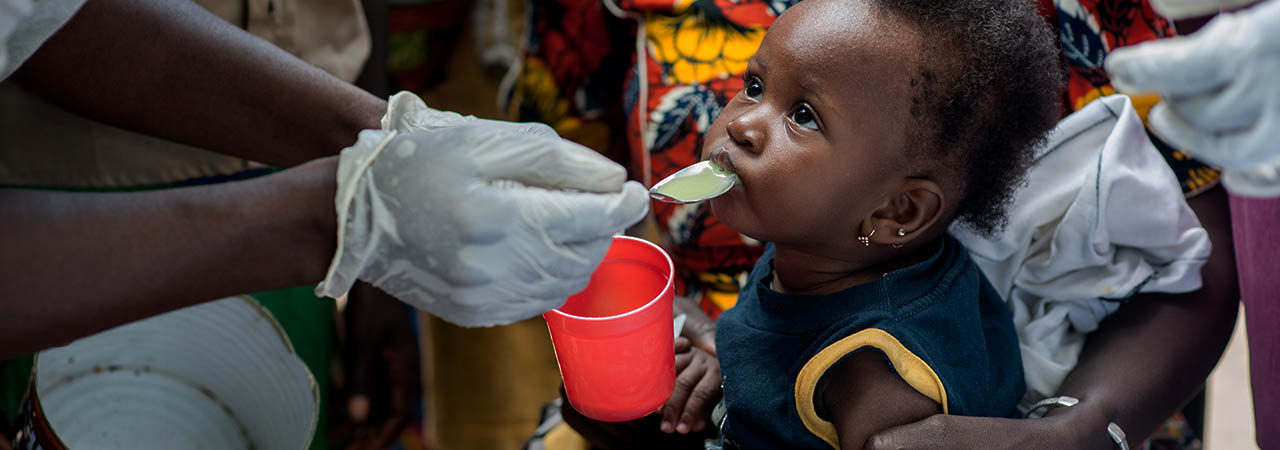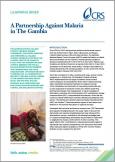

Media CenterCatholic Relief Services to Study New Malaria Prevention Tool in Mali and Uganda

FOR IMMEDIATE RELEASE
CONTACT:
Nikki Gamer
Catholic Relief Services
[email protected]
(443) 955- 7125
A new global grant will help inform a University of Notre Dame-led study on the
effectiveness of spatial repellents at preventing mosquito-borne diseases like malaria
BALTIMORE, MD, Feb. 13, 2019–As part of a consortium led by the University of Notre Dame, Catholic Relief Services (CRS) will receive funding to test the efficacy of a new spatial repellent product that could help prevent the transmission and spread of malaria worldwide, especially among displaced populations.
“We’re excited to work with the University of Notre Dame on this important initiative given their leading role in vector-borne disease research,” said Suzanne Van Hulle, a global malaria advisor for CRS. “Because of a continued global investment in fighting malaria, we are making progress towards malaria elimination. But there is still work to be done, especially to protect displaced people where traditional malaria prevention tools, such as insecticide-treated bed nets or indoor residual spraying, are not practical.”
The University of Notre Dame will use part of the $33.7 million grant over the course of five years to generate more evidence that supports a recommendation to the World Health Organization (WHO) of using spatial repellents for public health purposes. The grant was awarded by Unitaid, an international organization that invests in new ways to prevent, diagnose and treat HIV/AIDS, hepatitis C, tuberculosis and malaria more quickly, more affordably and more effectively.
Spatial repellents as a form of malaria prevention release volatile chemicals into the air to inhibit certain insect behaviors such as feeding. They also encourage movement away from a treated space. Repellent-treated plastic sheets are a new spatial repellent product. With Unitaid’s funding and support, CRS will be Notre Dame’s implementing partner for the study’s test sites in Mali and Uganda, where CRS will study best practices for implementing humanitarian programming using the repellent-treated plastic sheets.
“Because of our extensive work and experience in Mali and Uganda with people who have been displaced from their homes, we are well positioned to determine if repellent-treated sheets will work in places like refugee camps, where people don’t live in permanent housing,” Van Hulle said. "Unfortunately, current methods of preventing infection and transmission are not practical in these contexts. That’s why these new tools under development could be a game changer.”
The goal of the research is to give WHO enough information to include spatial repellant use for public health purposes among its global recommendations for key tools to prevent malaria, a decision that could eventually shape global and national policies.
According to WHO, upwards of 200 million people are infected by malaria each year, while nearly half a million people die of the disease annually, most of them children in Sub-Saharan Africa.
In 2017, CRS implemented malaria-related programming in 14 countries, reaching up to 65 million people. Ongoing projects include supporting national malaria programs with large-scale distributions of insecticide-treated bed nets; health worker trainings; and seasonal malaria chemoprevention programming.
###
Catholic Relief Services is the official international humanitarian agency of the Catholic community in the United States. The agency alleviates suffering and provides assistance to people in need in more than 100 countries, without regard to race, religion or nationality. CRS’ relief and development work is accomplished through programs of emergency response, HIV, health, agriculture, education, microfinance and peacebuilding. For more information, visit www.crs.org or www.crsespanol.org and follow Catholic Relief Services on social media: Facebook, Twitter at @CatholicRelief, @CRSnews and @CRSnoticias, Instagram, Pinterest and YouTube.
Unitaid is an international organization that invests in new ways to prevent, diagnose and treat HIV/AIDS, hepatitis C, tuberculosis and malaria more quickly, more affordably and more effectively. It accelerates access to innovation so that critical health products can reach the people who most need them. Unitaid’s work facilitates large-scale introduction of health products through funding by the Global Fund, the United States President’s Emergency Plan for AIDS Relief (PEPFAR) and by governments.
-----------------------------------------------------------------------------------------------------------------------------------------
Journalists & editors:
For photos, audio clips, video material & b-roll, contact: Nikki Gamer at [email protected] or 443-955-7125




